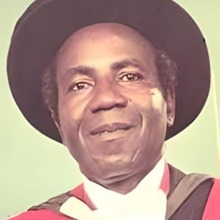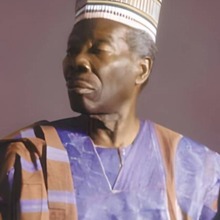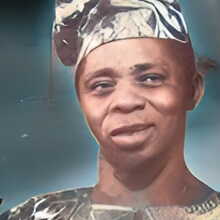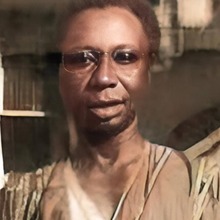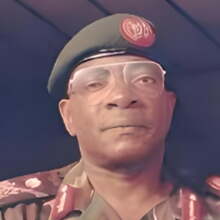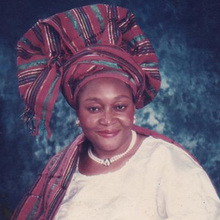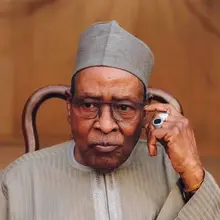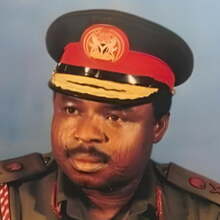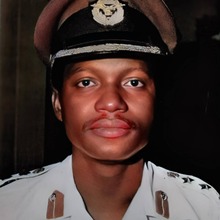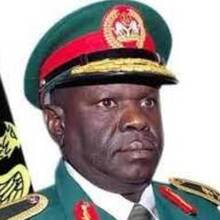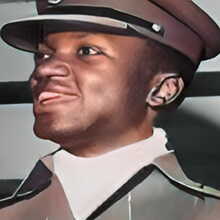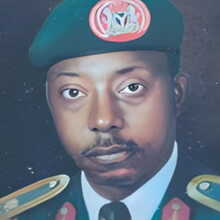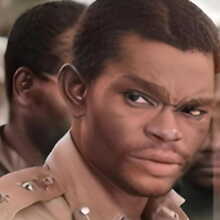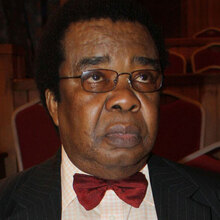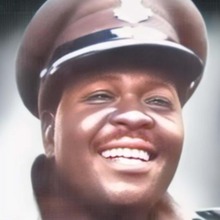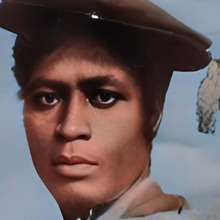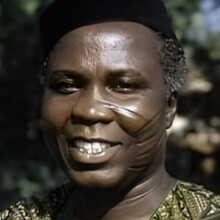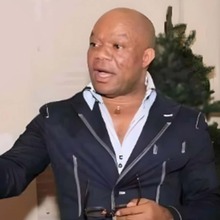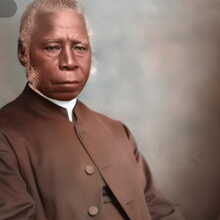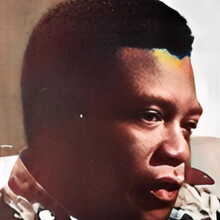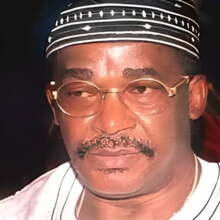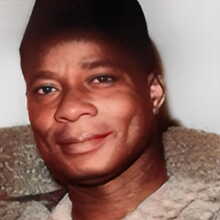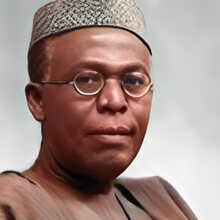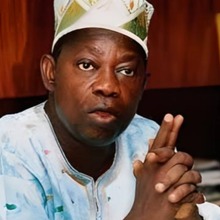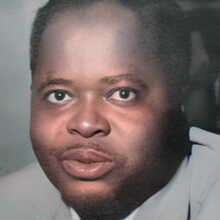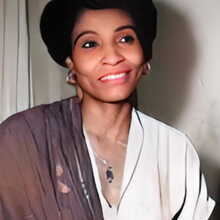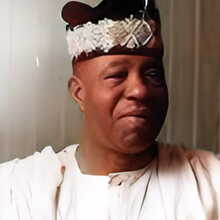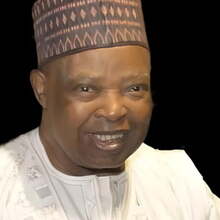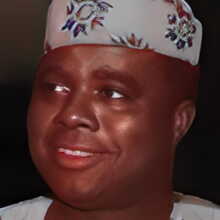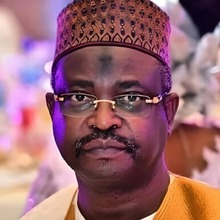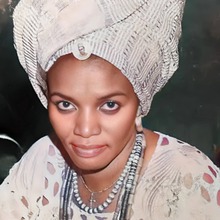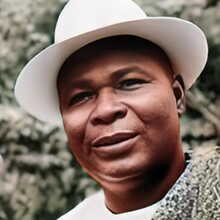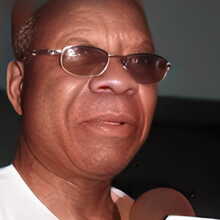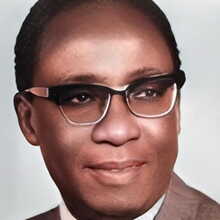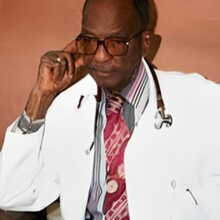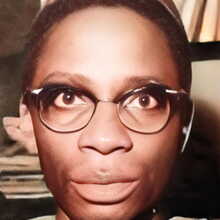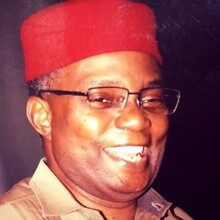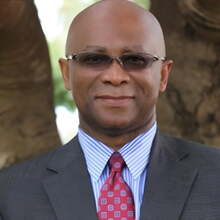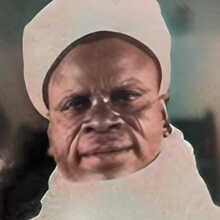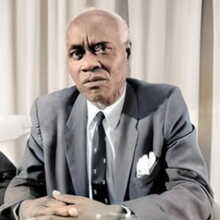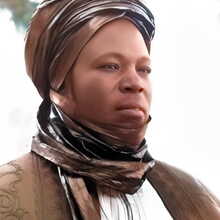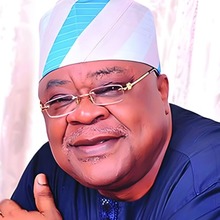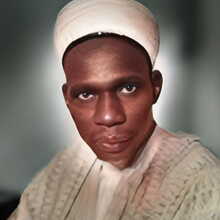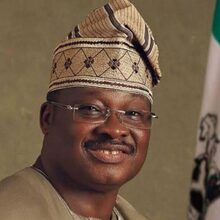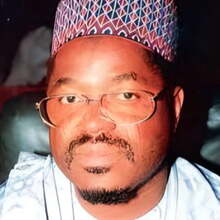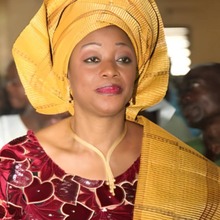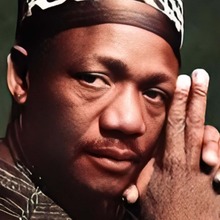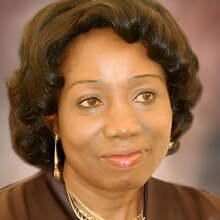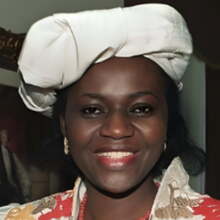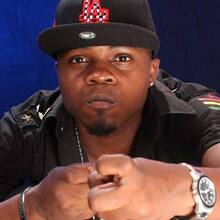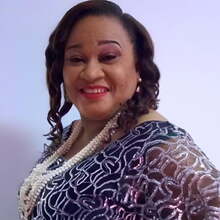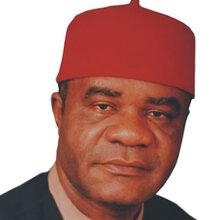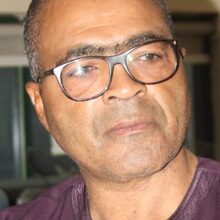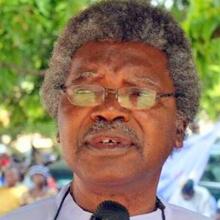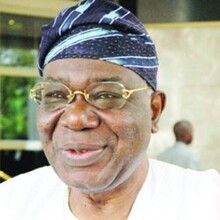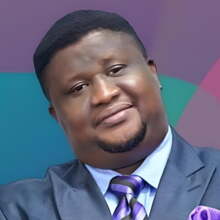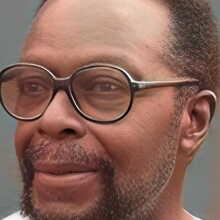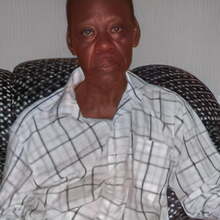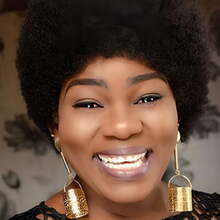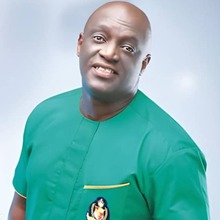 Salihu Ibrahim
1935 - 2018
Chief of Army Staff
Salihu Ibrahim
1935 - 2018
Chief of Army Staff
 Chinua Achebe
1930 - 2013
Novelist and professor
Chinua Achebe
1930 - 2013
Novelist and professor
 Philip Effiong
1925 - 2003
Military officer and Biafran leader
Philip Effiong
1925 - 2003
Military officer and Biafran leader
 Mbazulike Amaechi
1929 - 2022
First Republic Minister of Aviation
Mbazulike Amaechi
1929 - 2022
First Republic Minister of Aviation
 Chukwuma Bamidele Azikiwe
1940 - 2015
Diplomat and political figure
Chukwuma Bamidele Azikiwe
1940 - 2015
Diplomat and political figure
 Ojo Arowosafe
1957 - 2023
Nollywood actor and filmmaker
Ojo Arowosafe
1957 - 2023
Nollywood actor and filmmaker
 Mohammed Inuwa Wushishi
1940 - 2021
Chief of Army Staff
Mohammed Inuwa Wushishi
1940 - 2021
Chief of Army Staff
 Sammie Okposo
1971 - 2022
Gospel artist
Sammie Okposo
1971 - 2022
Gospel artist
 Joseph Wayas
1941 - 2021
Senate President of Nigeria
Joseph Wayas
1941 - 2021
Senate President of Nigeria
 Funmilayo Olayinka
1960 - 2013
Deputy Governor of Ekiti State
Funmilayo Olayinka
1960 - 2013
Deputy Governor of Ekiti State
 Kudirat Abiola
1951 - 1996
Pro-democracy campaigner
Kudirat Abiola
1951 - 1996
Pro-democracy campaigner
 Hubert Ogunde
1916 - 1990
Theatre manager and musician
Hubert Ogunde
1916 - 1990
Theatre manager and musician
 Bisi Komolafe
1986 - 2012
Actress, film director, film producer
Bisi Komolafe
1986 - 2012
Actress, film director, film producer
 Babatunde Olatunji
1927 - 2003
Drummer, social activist, recording artist
Babatunde Olatunji
1927 - 2003
Drummer, social activist, recording artist
 Ayinde Bakare
1912 - 1972
Jùjú and highlife bandleader
Ayinde Bakare
1912 - 1972
Jùjú and highlife bandleader
 Stella Ameyo Adadevoh
1956 - 2014
Physician and endocrinologist
Stella Ameyo Adadevoh
1956 - 2014
Physician and endocrinologist
 Justus Esiri
1942 - 2013
Actor
Justus Esiri
1942 - 2013
Actor
 Ahmed Joda
1930 - 2021
Permanent Secretary, Ministry of Industries
Ahmed Joda
1930 - 2021
Permanent Secretary, Ministry of Industries
 Yinka Craig
1948 - 2008
Sports commentator and analyst
Yinka Craig
1948 - 2008
Sports commentator and analyst
 Oladapo Olaitan Olaonipekun
1984 - 2010
Rapper, singer
Oladapo Olaitan Olaonipekun
1984 - 2010
Rapper, singer
 Sound Sultan
1976 - 2021
Rapper, singer, songwriter, actor, comedian
Sound Sultan
1976 - 2021
Rapper, singer, songwriter, actor, comedian
 Rashidi Yekini
1963 - 2012
Forward
Rashidi Yekini
1963 - 2012
Forward
 Benjamin Adekunle
1936 - 2014
Civil War commander
Benjamin Adekunle
1936 - 2014
Civil War commander
 Lamidi Olayiwola Adeyemi III
1938 - 2022
Monarch of the Yoruba town of Oyo
Lamidi Olayiwola Adeyemi III
1938 - 2022
Monarch of the Yoruba town of Oyo
 Ayorinde Babayemi Ilori Faboro
1985 - 2021
Music producer
Ayorinde Babayemi Ilori Faboro
1985 - 2021
Music producer
 Jim Lawson Maduike
1958 - 2021
Actor
Jim Lawson Maduike
1958 - 2021
Actor
 Franca Afegbua
1943 - 2023
Senator of Bendel North
Franca Afegbua
1943 - 2023
Senator of Bendel North
 Mohbad
1996 - 2023
Afrobeats artist
Mohbad
1996 - 2023
Afrobeats artist
 Ada Ameh
1974 - 2022
Actress
Ada Ameh
1974 - 2022
Actress
 Evan Enwerem
1935 - 2007
President of the Nigerian Senate
Evan Enwerem
1935 - 2007
President of the Nigerian Senate
 Ahmadu Bello
1910 - 1966
Premier of Northern Nigeria
Ahmadu Bello
1910 - 1966
Premier of Northern Nigeria
 Tai Solarin
1916 - 1994
Founder of Mayflower School
Tai Solarin
1916 - 1994
Founder of Mayflower School
 Alhaji Haruna Ishola
1919 - 1983
Apala musician
Alhaji Haruna Ishola
1919 - 1983
Apala musician
 Aare Boluwatife Akin-Olugbade
1956 - 2021
lawyer and Rolls-Royce collector
Aare Boluwatife Akin-Olugbade
1956 - 2021
lawyer and Rolls-Royce collector
 Lateef Kayode Jakande
1929 - 2021
Governor of Lagos State and Minister of Works
Lateef Kayode Jakande
1929 - 2021
Governor of Lagos State and Minister of Works
 Folabi Olumide
1936 - 2021
first Vice-Chancellor of Lagos State University
Folabi Olumide
1936 - 2021
first Vice-Chancellor of Lagos State University
 Tony Momoh
1939 - 2021
Minister of Information and Culture
Tony Momoh
1939 - 2021
Minister of Information and Culture
 Clara Oshiomhole
1956 - 2010
Civil servant
Clara Oshiomhole
1956 - 2010
Civil servant
 Gabriel Okara
1921 - 2019
Poet and novelist
Gabriel Okara
1921 - 2019
Poet and novelist
 Abubakar Tafawa Balewa
1912 - 1966
Prime minister of Nigeria
Abubakar Tafawa Balewa
1912 - 1966
Prime minister of Nigeria
 Chinedu Udoji
1989 - 2018
Midfielder
Chinedu Udoji
1989 - 2018
Midfielder
 Dora Akunyili
1954 - 2014
Director-general of NAFDAC
Dora Akunyili
1954 - 2014
Director-general of NAFDAC
 Kingsley Ozumba Mbadiwe
1915 - 1990
Nationalist, government minister
Kingsley Ozumba Mbadiwe
1915 - 1990
Nationalist, government minister
 Nsikak Eduok
1947 - 2021
Chief of the Air Staff of the Nigerian Air Force
Nsikak Eduok
1947 - 2021
Chief of the Air Staff of the Nigerian Air Force
 Vincent Eze Ogbulafor
1949 - 2022
National Chairman of PDP
Vincent Eze Ogbulafor
1949 - 2022
National Chairman of PDP
 Abdullahi Dikko Inde
1960 - 2021
Comptroller-General of Nigerian Customs Service
Abdullahi Dikko Inde
1960 - 2021
Comptroller-General of Nigerian Customs Service
 Nnamdi Benjamin Azikiwe
1904 - 1996
First president of Nigeria
Nnamdi Benjamin Azikiwe
1904 - 1996
First president of Nigeria
 Idris Alkali
1960 - 2018
Major general in the Nigerian Army
Idris Alkali
1960 - 2018
Major general in the Nigerian Army
 Hannah Idowu Dideolu Awolowo
1915 - 2015
First Lady of the Western Region
Hannah Idowu Dideolu Awolowo
1915 - 2015
First Lady of the Western Region
 Funsho Williams
1948 - 2006
Civil engineer and commissioner
Funsho Williams
1948 - 2006
Civil engineer and commissioner
 Maryam Babangida
1948 - 2009
First Lady of Nigeria
Maryam Babangida
1948 - 2009
First Lady of Nigeria
 Demola Seriki
1959 - 2022
Nigerian ambassador to Spain
Demola Seriki
1959 - 2022
Nigerian ambassador to Spain
 Chinedu Nwadike
1983 - 2022
Gospel singer and actor
Chinedu Nwadike
1983 - 2022
Gospel singer and actor
 Dan Maraya Jos
1946 - 2015
Hausa griot and kontigi player
Dan Maraya Jos
1946 - 2015
Hausa griot and kontigi player
 Joe Erico
1948 - 2021
Goalkeeper and assistant coach
Joe Erico
1948 - 2021
Goalkeeper and assistant coach
 Mamman Jiya Vatsa
1940 - 1986
Minister of the Federal Capital Abuja
Mamman Jiya Vatsa
1940 - 1986
Minister of the Federal Capital Abuja
 Victor Samuel Leonard Malu
1947 - 2017
Chief of Army Staff
Victor Samuel Leonard Malu
1947 - 2017
Chief of Army Staff
 Alhaji Alade Odunewu
1927 - 2013
Journalist, editor, columnist, media consultant
Alhaji Alade Odunewu
1927 - 2013
Journalist, editor, columnist, media consultant
 Shehu Shagari
1925 - 2018
President of Nigeria
Shehu Shagari
1925 - 2018
President of Nigeria
 Oluyemi Lawrence Adeyemi
1948 - 2023
Actor
Oluyemi Lawrence Adeyemi
1948 - 2023
Actor
 Christopher Gbelokoto Okojie
1920 - 2006
Health Minister of Nigeria
Christopher Gbelokoto Okojie
1920 - 2006
Health Minister of Nigeria
 Adedigba Mukaila
1950 - 2023
Nollywood actor and director
Adedigba Mukaila
1950 - 2023
Nollywood actor and director
 Chris Mba
1959 - 2023
Pop singer
Chris Mba
1959 - 2023
Pop singer
 Ayodele Awojobi
1937 - 1984
Mechanical engineer, social activist, author
Ayodele Awojobi
1937 - 1984
Mechanical engineer, social activist, author
 Michael Iheonukara Okpara
1920 - 1984
Premier of Eastern Nigeria
Michael Iheonukara Okpara
1920 - 1984
Premier of Eastern Nigeria
 Yemi Tella
1951 - 2007
Football coach
Yemi Tella
1951 - 2007
Football coach
 Margaret Ekpo
1914 - 2006
Women's rights activist and social mobilizer
Margaret Ekpo
1914 - 2006
Women's rights activist and social mobilizer
 Ojo Maduekwe
1945 - 2016
Minister of Foreign Affairs
Ojo Maduekwe
1945 - 2016
Minister of Foreign Affairs
 Olusegun Kokumo Agagu
1948 - 2013
Governor of Ondo State
Olusegun Kokumo Agagu
1948 - 2013
Governor of Ondo State
 Obafemi Awolowo
1909 - 1987
Premier of Western Nigeria, Federal Commissioner
Obafemi Awolowo
1909 - 1987
Premier of Western Nigeria, Federal Commissioner
 Funmilayo Ransome-Kuti
1900 - 1978
Educator and political leader
Funmilayo Ransome-Kuti
1900 - 1978
Educator and political leader
 Sonny Okosun
1947 - 2008
Leader of the Ozzidi band
Sonny Okosun
1947 - 2008
Leader of the Ozzidi band
 Adebayo Alao Akala
1950 - 2022
Governor of Oyo State
Adebayo Alao Akala
1950 - 2022
Governor of Oyo State
 Johnson Thomas Umunnakwe Aguiyi-Ironsi
1924 - 1966
First military head of state of Nigeria
Johnson Thomas Umunnakwe Aguiyi-Ironsi
1924 - 1966
First military head of state of Nigeria
 Samuel Sochukwuma Okwaraji
1964 - 1989
Footballer and lawyer
Samuel Sochukwuma Okwaraji
1964 - 1989
Footballer and lawyer
 Umaru Dikko
1936 - 2014
Transport minister
Umaru Dikko
1936 - 2014
Transport minister
 Benjamin Chukwudum Nnamdi Anyene
1951 - 2019
Commissioner for Health in Anambra State
Benjamin Chukwudum Nnamdi Anyene
1951 - 2019
Commissioner for Health in Anambra State
 Nwafor Orizu
1914 - 1999
President of the Nigerian Senate
Nwafor Orizu
1914 - 1999
President of the Nigerian Senate
 Olubayo Adefemi
1985 - 2011
Defender
Olubayo Adefemi
1985 - 2011
Defender
 Umaru Musa Yar'Adua
1951 - 2010
President of Nigeria
Umaru Musa Yar'Adua
1951 - 2010
President of Nigeria
 Dan Nkoloagu
1937 - 2021
Nollywood actor
Dan Nkoloagu
1937 - 2021
Nollywood actor
 Ibrahim Coomassie
1942 - 2018
Inspector General of Police
Ibrahim Coomassie
1942 - 2018
Inspector General of Police
 Goldie Harvey
1981 - 2013
Singer, rapper, songwriter, television personality
Goldie Harvey
1981 - 2013
Singer, rapper, songwriter, television personality
 Olumide Bakare
1953 - 2017
Actor, television personality
Olumide Bakare
1953 - 2017
Actor, television personality
 Amaka Igwe
1963 - 2014
Writer and director
Amaka Igwe
1963 - 2014
Writer and director
 Joe Tamuno-Bididamaa Tom West
1965 - 2006
Nollywood actor
Joe Tamuno-Bididamaa Tom West
1965 - 2006
Nollywood actor
 Olikoye Ransome-Kuti
1927 - 2003
Paediatrician, activist and health minister
Olikoye Ransome-Kuti
1927 - 2003
Paediatrician, activist and health minister
 Sani Abacha
1943 - 1998
Head of state of Nigeria
Sani Abacha
1943 - 1998
Head of state of Nigeria
 Jaja Anucha Ndubuisi Wachuku
1918 - 1996
First Speaker of Nigerian House of Representatives
Jaja Anucha Ndubuisi Wachuku
1918 - 1996
First Speaker of Nigerian House of Representatives
 Zara Gretti
1983 - 2014
Singer, rapper, songwriter, television personality
Zara Gretti
1983 - 2014
Singer, rapper, songwriter, television personality
 Festus Okotie-Eboh
1912 - 1966
Finance minister of Nigeria
Festus Okotie-Eboh
1912 - 1966
Finance minister of Nigeria
 Adekunle Fajuyi
1926 - 1966
Military governor of Western Nigeria
Adekunle Fajuyi
1926 - 1966
Military governor of Western Nigeria
 Ayinla Omowura
1933 - 1980
Apala musician
Ayinla Omowura
1933 - 1980
Apala musician
 Peter Enahoro
1935 - 2023
Journalist and author
Peter Enahoro
1935 - 2023
Journalist and author
 Ernest Shonekan
1936 - 2022
Interim head of state of Nigeria
Ernest Shonekan
1936 - 2022
Interim head of state of Nigeria
 James Ocholi
1960 - 2016
Minister of State for Labour and Productivity
James Ocholi
1960 - 2016
Minister of State for Labour and Productivity
 Ghali Umar Na'Abba
1958 - 2023
Speaker of the House of Representatives
Ghali Umar Na'Abba
1958 - 2023
Speaker of the House of Representatives
 Fela Kuti
1938 - 1997
Afrobeat pioneer and political dissident
Fela Kuti
1938 - 1997
Afrobeat pioneer and political dissident
 Martins Kuye
1942 - 2021
Minister of commerce and industry
Martins Kuye
1942 - 2021
Minister of commerce and industry
 Remi Oyo
1952 - 2014
Journalist and presidential spokesperson
Remi Oyo
1952 - 2014
Journalist and presidential spokesperson
 Dejumo Lewis
1943 - 2023
Actor
Dejumo Lewis
1943 - 2023
Actor
 Lari Williams
1940 - 2022
Actor, poet, and playwright
Lari Williams
1940 - 2022
Actor, poet, and playwright
 Cyprian Ekwensi
1921 - 2007
Novelist, short-story writer, children's author
Cyprian Ekwensi
1921 - 2007
Novelist, short-story writer, children's author
 Akinloye Akinyemi
1954 - 2012
Major in the Nigerian Army Signal Corps
Akinloye Akinyemi
1954 - 2012
Major in the Nigerian Army Signal Corps
 Chike Obi
1921 - 2008
Mathematics professor and Dynamic Party leader
Chike Obi
1921 - 2008
Mathematics professor and Dynamic Party leader
 Sunday Akanbi Akinola
1942 - 2023
Actor and comedian
Sunday Akanbi Akinola
1942 - 2023
Actor and comedian
 Muyiwa Osinuga
1977 - 2016
Singer and songwriter
Muyiwa Osinuga
1977 - 2016
Singer and songwriter
 Ossy Chinedu Prestige
1965 - 2021
Businessman and legislator
Ossy Chinedu Prestige
1965 - 2021
Businessman and legislator
 Thomas Adesanya Ige Grillo
1927 - 1998
Anatomy professor
Thomas Adesanya Ige Grillo
1927 - 1998
Anatomy professor
 Festus Iyayi
1947 - 2013
Writer and academic
Festus Iyayi
1947 - 2013
Writer and academic
 Ernest Asuzu
1984 - 2021
Actor and singer
Ernest Asuzu
1984 - 2021
Actor and singer
 T.M. Aluko
1918 - 2010
Novelist, playwright, poet, town planner
T.M. Aluko
1918 - 2010
Novelist, playwright, poet, town planner
 Dele Giwa
1947 - 1986
Journalist, editor,founder of Newswatch magazine
Dele Giwa
1947 - 1986
Journalist, editor,founder of Newswatch magazine
 Adebayo Faleti
1921 - 2017
Actor, poet, broadcaster, translator
Adebayo Faleti
1921 - 2017
Actor, poet, broadcaster, translator
 Nwali Sylvester Ngwuta
1951 - 2021
Justice of the Supreme Court of Nigeria
Nwali Sylvester Ngwuta
1951 - 2021
Justice of the Supreme Court of Nigeria
 Diepreye Alamieyeseigha
1952 - 2015
Governor of Bayelsa State
Diepreye Alamieyeseigha
1952 - 2015
Governor of Bayelsa State
 Rebecca Adebimpe Adekola
1971 - 2002
Actress
Rebecca Adebimpe Adekola
1971 - 2002
Actress
 Chukwuma Kaduna Nzeogwu
1937 - 1967
Military officer
Chukwuma Kaduna Nzeogwu
1937 - 1967
Military officer
 Tafa Oloyede
1953 - 2022
Yoruba theatre artist
Tafa Oloyede
1953 - 2022
Yoruba theatre artist
 Moses Olaiya
1936 - 2018
Comedy and drama
Moses Olaiya
1936 - 2018
Comedy and drama
 Sam Obi
1961 - 2021
Speaker of Delta State house of assembly
Sam Obi
1961 - 2021
Speaker of Delta State house of assembly
 Alhaji Salihu Tanko
1930 - 2021
Emir of Kagara
Alhaji Salihu Tanko
1930 - 2021
Emir of Kagara
 Akanu Ibiam
1906 - 1995
Medical missionary and Governor of Eastern Region
Akanu Ibiam
1906 - 1995
Medical missionary and Governor of Eastern Region
 Ahmed Aboki Abdullahi
1945 - 2021
Brigadier General of the Nigerian army
Ahmed Aboki Abdullahi
1945 - 2021
Brigadier General of the Nigerian army
 Bukky Ajayi
1934 - 2016
Nollywood actress and television personality
Bukky Ajayi
1934 - 2016
Nollywood actress and television personality
 Peace Anyiam-Osigwe
1969 - 2023
Founder of Africa Movie Academy Awards
Peace Anyiam-Osigwe
1969 - 2023
Founder of Africa Movie Academy Awards
 Oliver De Coque
1947 - 2008
Igbo highlife music
Oliver De Coque
1947 - 2008
Igbo highlife music
 Aminu Kano
1920 - 1983
Teacher and leader of socialist movement
Aminu Kano
1920 - 1983
Teacher and leader of socialist movement
 Orlando Martins
1899 - 1985
Film and stage actor
Orlando Martins
1899 - 1985
Film and stage actor
 Oronto Douglas
1966 - 2015
Human rights lawyer and presidential adviser
Oronto Douglas
1966 - 2015
Human rights lawyer and presidential adviser
 Alhaji Ahmed Hassan Jumare
1950 - 2021
Former Speaker of Kaduna State House of Assembly
Alhaji Ahmed Hassan Jumare
1950 - 2021
Former Speaker of Kaduna State House of Assembly
 Chukwuemeka Odumegwu Ojukwu
1933 - 2011
President of Biafra
Chukwuemeka Odumegwu Ojukwu
1933 - 2011
President of Biafra
 Enebeli Elebuwa
1947 - 2012
Actor
Enebeli Elebuwa
1947 - 2012
Actor
 Osinachi Nwachukwu
1979 - 2022
Gospel musician
Osinachi Nwachukwu
1979 - 2022
Gospel musician
 Dominic Ignatius Ekandem
1917 - 1995
Catholic cardinal and archbishop
Dominic Ignatius Ekandem
1917 - 1995
Catholic cardinal and archbishop
 Ken Saro-Wiwa
1941 - 1995
Writer, television producer
Ken Saro-Wiwa
1941 - 1995
Writer, television producer
 Oladipo Diya
1944 - 2023
Chief of General Staff
Oladipo Diya
1944 - 2023
Chief of General Staff
 Saliu Adetunji
1928 - 2022
Olubadan of Ibadan
Saliu Adetunji
1928 - 2022
Olubadan of Ibadan
 Alex Ekwueme
1932 - 2017
Vice president of Nigeria
Alex Ekwueme
1932 - 2017
Vice president of Nigeria
 Akinwunmi Isola
1939 - 2018
Yoruba literature
Akinwunmi Isola
1939 - 2018
Yoruba literature
 Abdulkadir Kure
1956 - 2017
Governor of Niger State
Abdulkadir Kure
1956 - 2017
Governor of Niger State
 Chief Anthony Eromosele Enahoro
1923 - 2010
Journalist, nationalist, pro-democracy activist
Chief Anthony Eromosele Enahoro
1923 - 2010
Journalist, nationalist, pro-democracy activist
 Tayo Aderinokun
1955 - 2011
CEO of Guaranty Trust Bank
Tayo Aderinokun
1955 - 2011
CEO of Guaranty Trust Bank
 Obinna Nwafor
1965 - 2023
Nollywood actor and producer
Obinna Nwafor
1965 - 2023
Nollywood actor and producer
 Alvan Ikoku
1900 - 1971
Educationist and politician
Alvan Ikoku
1900 - 1971
Educationist and politician
 Ezekiel Atang
1973 - 2022
Senior Pastor of God's House Of Refuge
Ezekiel Atang
1973 - 2022
Senior Pastor of God's House Of Refuge
 Sam Loco Efe
1945 - 2011
Actor, producer, director
Sam Loco Efe
1945 - 2011
Actor, producer, director
 Muna Obiekwe
1979 - 2015
Actor
Muna Obiekwe
1979 - 2015
Actor
 Christopher Ifekandu Okigbo
1932 - 1967
Poet, teacher, librarian
Christopher Ifekandu Okigbo
1932 - 1967
Poet, teacher, librarian
 Alex Uruemu Ibru
1945 - 2011
Founder and publisher of The Guardian newspaper
Alex Uruemu Ibru
1945 - 2011
Founder and publisher of The Guardian newspaper
We Need -- admin in



